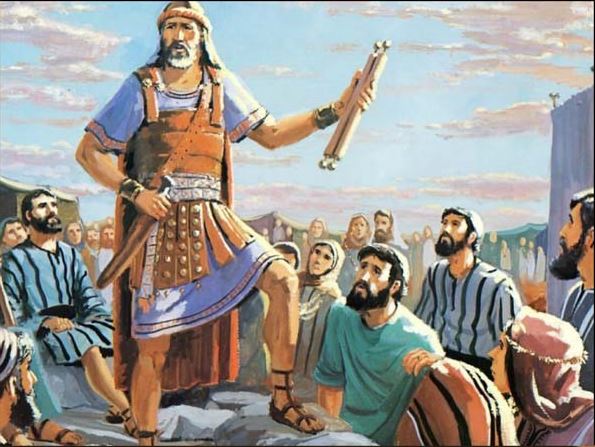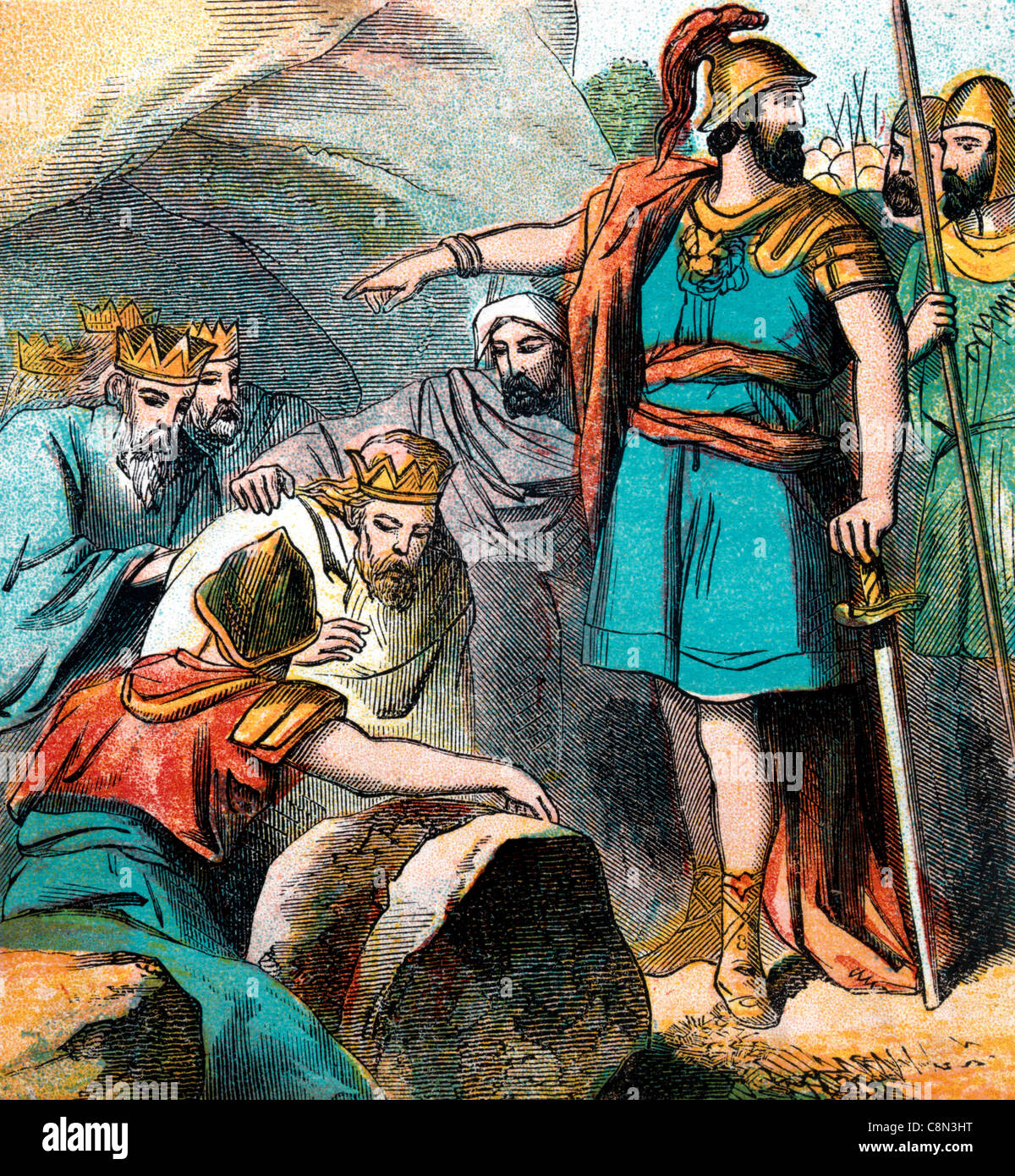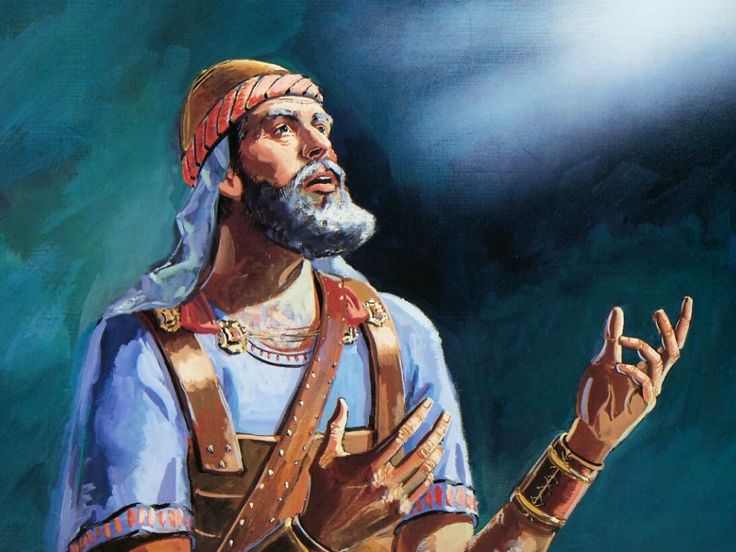Joshua Davis Osmond - Unpacking A Historic Figure's Journey
Some names, it seems, carry a certain weight, a kind of echo from stories told through the ages. When you hear a name like "Joshua Davis Osmond," you might, in a way, find yourself thinking about figures whose lives have shaped narratives for countless generations. It's almost as if certain names are tied to a deep sense of purpose and leadership, drawing our thoughts to those who faced significant trials and triumphs.
This exploration is about just such a figure, someone whose story, so to speak, is woven into the very fabric of ancient accounts. We're going to look closely at a person named Joshua, whose experiences, as described in old texts, truly offer a rich picture of what it means to lead, to serve, and to hold onto belief even when things feel quite uncertain. This individual's life, as we'll see, was full of moments that asked for immense courage and a steady hand.
Our focus will be on the events that shaped this particular Joshua, the moments when he was called upon to step up, and the lasting impact he had on a community seeking a new home. We will draw all our information from the provided text, giving us a unique lens through which to consider the qualities that made him such a central character in those ancient writings. It's a look at a story that, honestly, still resonates with many people today.
Table of Contents
- The Early Days of a Remarkable Figure - Who Was Joshua Davis Osmond?
- A Leader's First Big Test - What Challenges Did Joshua Davis Osmond Face?
- Stepping Into Giant Shoes - How Did Joshua Davis Osmond Lead After Moses?
- A Legacy That Endures - What Can We Learn from Joshua Davis Osmond?
The Early Days of a Remarkable Figure - Who Was Joshua Davis Osmond?
When we consider the individual known as Joshua, as presented in the provided accounts, we are really talking about a person who played a very big part in a series of truly significant events. He was, in some respects, a major figure during the exodus, a period of immense change and movement for a large group of people. This time was, you know, a pivotal moment in their collective story, and Joshua was right there, at the heart of it all. His involvement began quite early, showing that his role was not just a sudden occurrence but something that developed over time.
Before he became the main leader, Joshua had a crucial task given to him by Moses, a very prominent figure himself. He was asked to pick out and take command of a group of fighters, a militia, for their very first clash after they had left Egypt. This initial encounter was against a group called the Amalekites, and it was, quite frankly, a very important moment for the people. This early responsibility really highlights the trust placed in Joshua's abilities, even at a relatively young stage in his public service. It suggests he had a knack for organization and a way of getting people to work together under trying circumstances.
The text describes Joshua as a devoted student, someone who truly absorbed what he was taught. This suggests a person who was always eager to learn and to understand deeper principles, which, you know, is a valuable trait for anyone in a position of influence. He was also called a saintly man, indicating a character that was considered morally upright and perhaps, in a way, spiritually aligned with the beliefs of his community. Furthermore, he was regarded as a brilliant military commander, which speaks to his strategic thinking and his capacity to lead troops effectively in battle. These descriptions paint a picture of a well-rounded individual, someone who combined intellectual curiosity with strong personal values and practical leadership skills.
Personal Details and Biography
The information we have about Joshua, particularly as it relates to someone we might consider "Joshua Davis Osmond" through the lens of ancient texts, gives us a glimpse into his background and key roles. While a traditional modern biography with birthdates and exact locations isn't available from the provided text, we can piece together some very important aspects of his life and identity. His name itself, in Hebrew, is "Yehoshua," which, you know, carries its own meaning and significance.
He was clearly a person of considerable importance, someone whose life was deeply intertwined with the fate of his people. His journey, from what we gather, was one of constant progression, moving from a supportive role to one of ultimate command. This progression, you know, wasn't just about gaining power; it was about stepping up to meet the needs of a whole community at a truly critical juncture in their history. The text, in a way, gives us the broad strokes of his existence, focusing on his contributions and his character.
We understand that he was the son of Nun, and that he served as Moses' aide, minister, or assistant, depending on the specific phrasing. This connection to Moses is, quite frankly, a defining aspect of his early career, showing his close association with the previous leader. The text also points out that his name, "Yehoshua," is made up of two parts, suggesting a deeper meaning behind it, though the specific components aren't detailed in the provided information. This kind of detail, you know, often tells us something about a person's heritage or destiny in ancient cultures.
| Detail | Description (from provided text) |
|---|---|
| Name in Hebrew | Yehoshua (BDB 221), made up of two parts |
| Parentage | Son of Nun |
| Prior Role | Moses’ aide, minister, assistant |
| Key Characteristics | Devoted student, saintly man, brilliant military commander |
| Major Association | Central figure in the Old Testament, particularly the Book of Joshua |
| Primary Achievement | Led the Israelites into the promised land after Moses' death |
A Leader's First Big Test - What Challenges Did Joshua Davis Osmond Face?
Every leader, it seems, faces a moment when they are truly put to the test, a situation that asks for everything they have. For Joshua, as the ancient accounts tell us, one of these very early and significant challenges came shortly after the people had left Egypt. He was given a very specific and demanding charge by Moses: to pick out and lead a group of fighters, a militia, for their first actual battle. This wasn't just any skirmish; it was their initial confrontation after gaining their freedom, against a group called the Amalekites. This moment, you know, was incredibly important for the morale and the very survival of the community.
This particular task was, in a way, a crucible for Joshua's leadership abilities. He wasn't just a follower anymore; he was responsible for selecting the right people, organizing them, and then commanding them in a truly dangerous situation. The success or failure of this battle would have, quite frankly, set a precedent for their entire journey. It was a moment that required not just bravery, but also strategic thinking and the ability to inspire confidence in those he led. The weight of this responsibility, so to speak, must have been immense, given the circumstances of their recent escape and their vulnerable position.
The text emphasizes that this was their "first battle after exiting Egypt." This detail is, you know, rather important because it means they were still very much in a transitional phase, perhaps not fully organized or experienced in warfare as a collective. Joshua had to step into this void and create order, discipline, and a plan for victory. This initial test, therefore, wasn't just about winning a fight; it was about establishing a foundation for their future as a self-governing and protected people. It showed, quite clearly, his early capacity to handle pressure and to deliver results when it mattered most.
Taking Charge Against Adversity
The act of taking charge, especially when facing tough times, is a defining characteristic of strong leaders. For Joshua, this was evident from the very beginning of his more public role. He was not just a participant; he was the one given the specific task of organizing a fighting force to meet a direct threat. This situation, you know, was about immediate survival and establishing their presence in a new environment. The Amalekites represented an early obstacle that needed to be overcome with decisive action.
His ability to select and command a militia group for this critical first battle speaks volumes about his practical skills. It wasn't just about giving orders; it was about understanding the needs of the moment, assessing the strengths of his people, and putting them in the best position to succeed. This kind of hands-on leadership, in a way, built trust and showed his followers that he was capable of guiding them through truly perilous situations. It was a very real demonstration of his military acumen.
The challenge against the Amalekites was, quite frankly, a defining moment for the emerging community. It was a test of their collective resolve and their ability to defend themselves. Joshua's role in this, as the one charged with leading the fight, meant he bore a significant portion of that responsibility. His success in this early engagement, so to speak, would have cemented his reputation as a capable and reliable figure, paving the way for his later, even more significant, leadership roles. It was, you know, a clear indication of his potential to rise to great occasions.
Stepping Into Giant Shoes - How Did Joshua Davis Osmond Lead After Moses?
Following in the footsteps of a truly towering figure like Moses is, quite frankly, an incredibly difficult task for anyone. Yet, after Moses, the servant of the Lord, passed away, Joshua was installed as the new leader. This transition wasn't just a simple handover; it marked a profound moment for the entire community, as they moved from one era of guidance to another. The weight of expectation on Joshua must have been immense, as he was now responsible for a vast number of people who had grown accustomed to Moses' unique leadership.
The text tells us very clearly that after Moses' passing, the Lord spoke directly to Joshua, son of Nun, Moses' aide. The message was plain: "Moses my servant is dead." This direct communication from a higher power, you know, underscored the divine mandate for Joshua's leadership. It wasn't just a human appointment; it was presented as a continuation of a larger plan. This kind of divine endorsement would have been, in a way, crucial for establishing his authority and gaining the full trust of the people he was now tasked with guiding.
The instruction given to Joshua was equally direct: "Now therefore arise, you and all these people." This was a call to action, a clear directive for him to take up the mantle and lead the community forward. He was Moses' successor, someone who was to guide the Israelites into the promised land. This was the ultimate goal of their long journey, a destination that Moses himself was not permitted to enter. Joshua's role was, therefore, absolutely central to the fulfillment of this long-held promise, a truly monumental undertaking.
Guiding a People Towards a New Horizon
The task of guiding an entire people towards a new future, especially after a period of wandering, requires a very particular kind of fortitude. Joshua's role as the one who led the Israelites into the promised land is, quite frankly, his most well-known achievement. This wasn't just a geographical move; it was the culmination of generations of hope and struggle. He was the one who, in a way, brought them to the threshold of their long-awaited home, a truly significant moment in their collective story.
The bible describes Joshua not only as a devoted student and a saintly man but also as a brilliant military commander. These qualities were, you know, absolutely essential for the challenges that lay ahead in settling the promised land. He needed the wisdom of a student to understand the divine directives, the integrity of a saintly man to maintain moral authority, and the strategic mind of a commander to overcome any resistance. His leadership was a blend of spiritual guidance and practical execution.
Joshua is a central figure in the bible, particularly in the Old Testament, and his story is presented as one where the kingdom of God breaks into the world of nations. At that time, national and political entities were often seen as creations of the gods, living proofs of their power. Joshua's actions, therefore, represented a direct challenge to these established views, showing a different kind of divine intervention and authority. His leadership was, in some respects, a very public display of a new order taking hold.
A Legacy That Endures - What Can We Learn from Joshua Davis Osmond?
The impact of a person's life can, you know, truly last for a very long time, shaping the way future generations think and act. Joshua's story, as it's presented in the ancient texts, offers a rich tapestry of strength, leadership, and a belief that never wavered. His journey, from his early days as a young soldier to his ultimate role as the primary guide for his people, is a powerful example of growth and dedication. It's a narrative that, quite frankly, continues to be explored for its enduring lessons about human spirit and purpose.
One of the most striking aspects of Joshua's legacy is his unwavering faith. This wasn't just a passive belief; it was an active, guiding principle that informed his every decision and action. In the face of daunting challenges, including leading a whole community into a new territory and facing various adversaries, his conviction remained strong. This steadfastness, in a way, provided a crucial anchor for the people he led, giving them confidence even when things seemed uncertain or difficult. It’s a very powerful reminder of the importance of inner conviction.
His leadership style also provides much to consider. He was charged with selecting and commanding a militia, demonstrating his ability to organize and direct people effectively. Later, he was installed as the leader after Moses, taking on an even greater responsibility. This progression shows a person who was not only capable of following but also of stepping up and taking the reins when the moment called for it. His ability to adapt and to lead in different capacities is, you know, a testament to his versatile skills and inherent qualities.
Faith, Fortitude, and Future Impact
The qualities of belief and inner strength are, quite frankly, often the cornerstones of any lasting influence. Joshua's life, as depicted in the texts, very clearly highlights these traits. He is best known for leading the Israelites into the promised land after Moses' passing and for his overall role in those monumental events. This was not a simple march; it involved considerable fortitude, facing down various obstacles and maintaining the morale of a large group of people over an extended period.
His journey, from his rise as a young soldier to becoming the principal figure guiding his people, shows a continuous development of his character and abilities. He was a person who grew into his responsibilities, learning and adapting along the way. This kind of personal evolution, you know, is something many can relate to, regardless of their own circumstances. It speaks to the idea that true leadership often emerges through experience and a willingness to embrace new challenges.
The story of Joshua is, in some respects, presented as the kingdom of God breaking into the world of nations. This concept is significant because, at that time, national and political groups were often viewed as the creation of the gods, serving as living proofs of their power. Joshua's actions, therefore, represented a different kind of divine intervention, one that established a new order and demonstrated a distinct form of spiritual authority. His legacy, consequently, isn't just about military victories or territorial gains; it's also about a deeper, spiritual reshaping of the world as it was understood then.
This article has explored the figure of Joshua, drawing entirely from the provided text, which describes a pivotal character from ancient history. We've looked at his early responsibilities, like commanding the first battle after leaving Egypt, and his significant role as Moses' successor in leading the Israelites into the promised land. We also touched upon his character as a devoted student, a saintly man, and a brilliant military commander, highlighting his unwavering faith and strong leadership qualities that shaped a very important period for his people.

The Book of JoshuaThe Book of Joshua

Joshua book bible hi-res stock photography and images - Alamy

Joshua-Portrait of the Man God Uses | Precept Austin